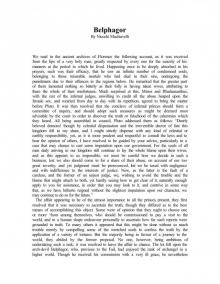- Home
- Niccolo Machiavelli
Valentino Page 9
Valentino Read online
Page 9
Alexander never did what he said,
Cesare never said what he did.
Italian Proverb.
Therefore it is unnecessary for a prince to have all the good
qualities I have enumerated, but it is very necessary to appear to
have them. And I shall dare to say this also, that to have them and
always to observe them is injurious, and that to appear to have them
is useful; to appear merciful, faithful, humane, religious, upright,
and to be so, but with a mind so framed that should you require not to
be so, you may be able and know how to change to the opposite.
And you have to understand this, that a prince, especially a new one,
cannot observe all those things for which men are esteemed, being
often forced, in order to maintain the state, to act contrary to
fidelity,[*] friendship, humanity, and religion. Therefore it is
necessary for him to have a mind ready to turn itself accordingly as
the winds and variations of fortune force it, yet, as I have said
above, not to diverge from the good if he can avoid doing so, but, if
compelled, then to know how to set about it.
[*] "Contrary to fidelity" or "faith," "contro alla fede," and "tutto
fede," "altogether faithful," in the next paragraph. It is
noteworthy that these two phrases, "contro alla fede" and "tutto
fede," were omitted in the Testina edition, which was published
with the sanction of the papal authorities. It may be that the
meaning attached to the word "fede" was "the faith," i.e. the
Catholic creed, and not as rendered here "fidelity" and
"faithful." Observe that the word "religione" was suffered to
stand in the text of the Testina, being used to signify
indifferently every shade of belief, as witness "the religion," a
phrase inevitably employed to designate the Huguenot heresy. South
in his Sermon IX, p. 69, ed. 1843, comments on this passage as
follows: "That great patron and Coryphaeus of this tribe, Nicolo
Machiavel, laid down this for a master rule in his political
scheme: 'That the show of religion was helpful to the politician,
but the reality of it hurtful and pernicious.'"
For this reason a prince ought to take care that he never lets
anything slip from his lips that is not replete with the above-named
five qualities, that he may appear to him who sees and hears him
altogether merciful, faithful, humane, upright, and religious. There
is nothing more necessary to appear to have than this last quality,
inasmuch as men judge generally more by the eye than by the hand,
because it belongs to everybody to see you, to few to come in touch
with you. Every one sees what you appear to be, few really know what
you are, and those few dare not oppose themselves to the opinion of
the many, who have the majesty of the state to defend them; and in the
actions of all men, and especially of princes, which it is not prudent
to challenge, one judges by the result.
For that reason, let a prince have the credit of conquering and
holding his state, the means will always be considered honest, and he
will be praised by everybody; because the vulgar are always taken by
what a thing seems to be and by what comes of it; and in the world
there are only the vulgar, for the few find a place there only when
the many have no ground to rest on.
One prince[*] of the present time, whom it is not well to name, never
preaches anything else but peace and good faith, and to both he is
most hostile, and either, if he had kept it, would have deprived him
of reputation and kingdom many a time.
[*] Ferdinand of Aragon. "When Machiavelli was writing 'The Prince' it
would have been clearly impossible to mention Ferdinand's name
here without giving offence." Burd's "Il Principe," p. 308.
CHAPTER XIX
THAT ONE SHOULD AVOID BEING DESPISED AND HATED
Now, concerning the characteristics of which mention is made above, I
have spoken of the more important ones, the others I wish to discuss
briefly under this generality, that the prince must consider, as has
been in part said before, how to avoid those things which will make
him hated or contemptible; and as often as he shall have succeeded he
will have fulfilled his part, and he need not fear any danger in other
reproaches.
It makes him hated above all things, as I have said, to be rapacious,
and to be a violator of the property and women of his subjects, from
both of which he must abstain. And when neither their property nor
their honor is touched, the majority of men live content, and he has
only to contend with the ambition of a few, whom he can curb with ease
in many ways.
It makes him contemptible to be considered fickle, frivolous,
effeminate, mean-spirited, irresolute, from all of which a prince
should guard himself as from a rock; and he should endeavour to show
in his actions greatness, courage, gravity, and fortitude; and in his
private dealings with his subjects let him show that his judgments are
irrevocable, and maintain himself in such reputation that no one can
hope either to deceive him or to get round him.
That prince is highly esteemed who conveys this impression of himself,
and he who is highly esteemed is not easily conspired against; for,
provided it is well known that he is an excellent man and revered by
his people, he can only be attacked with difficulty. For this reason a
prince ought to have two fears, one from within, on account of his
subjects, the other from without, on account of external powers. From
the latter he is defended by being well armed and having good allies,
and if he is well armed he will have good friends, and affairs will
always remain quiet within when they are quiet without, unless they
should have been already disturbed by conspiracy; and even should
affairs outside be disturbed, if he has carried out his preparations
and has lived as I have said, as long as he does not despair, he will
resist every attack, as I said Nabis the Spartan did.
But concerning his subjects, when affairs outside are disturbed he has
only to fear that they will conspire secretly, from which a prince can
easily secure himself by avoiding being hated and despised, and by
keeping the people satisfied with him, which it is most necessary for
him to accomplish, as I said above at length. And one of the most
efficacious remedies that a prince can have against conspiracies is
not to be hated and despised by the people, for he who conspires
against a prince always expects to please them by his removal; but
when the conspirator can only look forward to offending them, he will
not have the courage to take such a course, for the difficulties that
confront a conspirator are infinite. And as experience shows, many
have been the conspiracies, but few have been successful; because he
who conspires cannot act alone, nor can he take a companion except
from those whom he believes to be malcontents, and as soon as you have
opened your mind to a malcontent you have given him the m
aterial with
which to content himself, for by denouncing you he can look for every
advantage; so that, seeing the gain from this course to be assured,
and seeing the other to be doubtful and full of dangers, he must be a
very rare friend, or a thoroughly obstinate enemy of the prince, to
keep faith with you.
And, to reduce the matter into a small compass, I say that, on the
side of the conspirator, there is nothing but fear, jealousy, prospect
of punishment to terrify him; but on the side of the prince there is
the majesty of the principality, the laws, the protection of friends
and the state to defend him; so that, adding to all these things the
popular goodwill, it is impossible that any one should be so rash as
to conspire. For whereas in general the conspirator has to fear before
the execution of his plot, in this case he has also to fear the sequel
to the crime; because on account of it he has the people for an enemy,
and thus cannot hope for any escape.
Endless examples could be given on this subject, but I will be content
with one, brought to pass within the memory of our fathers. Messer
Annibale Bentivogli, who was prince in Bologna (grandfather of the
present Annibale), having been murdered by the Canneschi, who had
conspired against him, not one of his family survived but Messer
Giovanni,[*] who was in childhood: immediately after his assassination
the people rose and murdered all the Canneschi. This sprung from the
popular goodwill which the house of Bentivogli enjoyed in those days
in Bologna; which was so great that, although none remained there
after the death of Annibale who was able to rule the state, the
Bolognese, having information that there was one of the Bentivogli
family in Florence, who up to that time had been considered the son of
a blacksmith, sent to Florence for him and gave him the government of
their city, and it was ruled by him until Messer Giovanni came in due
course to the government.
[*] Giovanni Bentivogli, born in Bologna 1438, died at Milan 1508. He
ruled Bologna from 1462 to 1506. Machiavelli's strong condemnation
of conspiracies may get its edge from his own very recent
experience (February 1513), when he had been arrested and tortured
for his alleged complicity in the Boscoli conspiracy.
For this reason I consider that a prince ought to reckon conspiracies
of little account when his people hold him in esteem; but when it is
hostile to him, and bears hatred towards him, he ought to fear
everything and everybody. And well-ordered states and wise princes
have taken every care not to drive the nobles to desperation, and to
keep the people satisfied and contented, for this is one of the most
important objects a prince can have.
Among the best ordered and governed kingdoms of our times is France,
and in it are found many good institutions on which depend the liberty
and security of the king; of these the first is the parliament and its
authority, because he who founded the kingdom, knowing the ambition of
the nobility and their boldness, considered that a bit to their mouths
would be necessary to hold them in; and, on the other side, knowing
the hatred of the people, founded in fear, against the nobles, he
wished to protect them, yet he was not anxious for this to be the
particular care of the king; therefore, to take away the reproach
which he would be liable to from the nobles for favouring the people,
and from the people for favouring the nobles, he set up an arbiter,
who should be one who could beat down the great and favour the lesser
without reproach to the king. Neither could you have a better or a
more prudent arrangement, or a greater source of security to the king
and kingdom. From this one can draw another important conclusion, that
princes ought to leave affairs of reproach to the management of
others, and keep those of grace in their own hands. And further, I
consider that a prince ought to cherish the nobles, but not so as to
make himself hated by the people.
It may appear, perhaps, to some who have examined the lives and deaths
of the Roman emperors that many of them would be an example contrary
to my opinion, seeing that some of them lived nobly and showed great
qualities of soul, nevertheless they have lost their empire or have
been killed by subjects who have conspired against them. Wishing,
therefore, to answer these objections, I will recall the characters of
some of the emperors, and will show that the causes of their ruin were
not different to those alleged by me; at the same time I will only
submit for consideration those things that are noteworthy to him who
studies the affairs of those times.
It seems to me sufficient to take all those emperors who succeeded to
the empire from Marcus the philosopher down to Maximinus; they were
Marcus and his son Commodus, Pertinax, Julian, Severus and his son
Antoninus Caracalla, Macrinus, Heliogabalus, Alexander, and Maximinus.
There is first to note that, whereas in other principalities the
ambition of the nobles and the insolence of the people only have to be
contended with, the Roman emperors had a third difficulty in having to
put up with the cruelty and avarice of their soldiers, a matter so
beset with difficulties that it was the ruin of many; for it was a
hard thing to give satisfaction both to soldiers and people; because
the people loved peace, and for this reason they loved the unaspiring
prince, whilst the soldiers loved the warlike prince who was bold,
cruel, and rapacious, which qualities they were quite willing he
should exercise upon the people, so that they could get double pay and
give vent to their own greed and cruelty. Hence it arose that those
emperors were always overthrown who, either by birth or training, had
no great authority, and most of them, especially those who came new to
the principality, recognizing the difficulty of these two opposing
humours, were inclined to give satisfaction to the soldiers, caring
little about injuring the people. Which course was necessary, because,
as princes cannot help being hated by someone, they ought, in the
first place, to avoid being hated by every one, and when they cannot
compass this, they ought to endeavour with the utmost diligence to
avoid the hatred of the most powerful. Therefore, those emperors who
through inexperience had need of special favour adhered more readily
to the soldiers than to the people; a course which turned out
advantageous to them or not, accordingly as the prince knew how to
maintain authority over them.
From these causes it arose that Marcus, Pertinax, and Alexander, being
all men of modest life, lovers of justice, enemies to cruelty, humane,
and benignant, came to a sad end except Marcus; he alone lived and
died honoured, because he had succeeded to the throne by hereditary
title, and owed nothing either to the soldiers or the people; and
afterwards, being possessed of many virtues which made him respected,
he always kept both orders in their places wh
ilst he lived, and was
neither hated nor despised.
But Pertinax was created emperor against the wishes of the soldiers,
who, being accustomed to live licentiously under Commodus, could not
endure the honest life to which Pertinax wished to reduce them; thus,
having given cause for hatred, to which hatred there was added
contempt for his old age, he was overthrown at the very beginning of
his administration. And here it should be noted that hatred is
acquired as much by good works as by bad ones, therefore, as I said
before, a prince wishing to keep his state is very often forced to do
evil; for when that body is corrupt whom you think you have need of to
maintain yourself--it may be either the people or the soldiers or the
nobles--you have to submit to its humours and to gratify them, and
then good works will do you harm.
But let us come to Alexander, who was a man of such great goodness,
that among the other praises which are accorded him is this, that in
the fourteen years he held the empire no one was ever put to death by
him unjudged; nevertheless, being considered effeminate and a man who
allowed himself to be governed by his mother, he became despised, the
army conspired against him, and murdered him.
Turning now to the opposite characters of Commodus, Severus, Antoninus
Caracalla, and Maximinus, you will find them all cruel and rapacious--
men who, to satisfy their soldiers, did not hesitate to commit every
kind of iniquity against the people; and all, except Severus, came to
a bad end; but in Severus there was so much valour that, keeping the
soldiers friendly, although the people were oppressed by him, he
reigned successfully; for his valour made him so much admired in the
sight of the soldiers and people that the latter were kept in a way
astonished and awed and the former respectful and satisfied. And
because the actions of this man, as a new prince, were great, I wish
to show briefly that he knew well how to counterfeit the fox and the
lion, which natures, as I said above, it is necessary for a prince to
imitate.
Knowing the sloth of the Emperor Julian, he persuaded the army in
Sclavonia, of which he was captain, that it would be right to go to
Rome and avenge the death of Pertinax, who had been killed by the
praetorian soldiers; and under this pretext, without appearing to
aspire to the throne, he moved the army on Rome, and reached Italy
before it was known that he had started. On his arrival at Rome, the
Senate, through fear, elected him emperor and killed Julian. After
this there remained for Severus, who wished to make himself master of
the whole empire, two difficulties; one in Asia, where Niger, head of
the Asiatic army, had caused himself to be proclaimed emperor; the
other in the west where Albinus was, who also aspired to the throne.
And as he considered it dangerous to declare himself hostile to both,
he decided to attack Niger and to deceive Albinus. To the latter he
wrote that, being elected emperor by the Senate, he was willing to
share that dignity with him and sent him the title of Caesar; and,
moreover, that the Senate had made Albinus his colleague; which things
were accepted by Albinus as true. But after Severus had conquered and
killed Niger, and settled oriental affairs, he returned to Rome and
complained to the Senate that Albinus, little recognizing the benefits
that he had received from him, had by treachery sought to murder him,
and for this ingratitude he was compelled to punish him. Afterwards he
sought him out in France, and took from him his government and life.
He who will, therefore, carefully examine the actions of this man will
find him a most valiant lion and a most cunning fox; he will find him
feared and respected by every one, and not hated by the army; and it
need not be wondered at that he, a new man, was able to hold the
empire so well, because his supreme renown always protected him from

 The Prince
The Prince Valentino
Valentino The Portable Machiavelli
The Portable Machiavelli History of Florence and of the Affairs of Italy
History of Florence and of the Affairs of Italy Belphagor
Belphagor